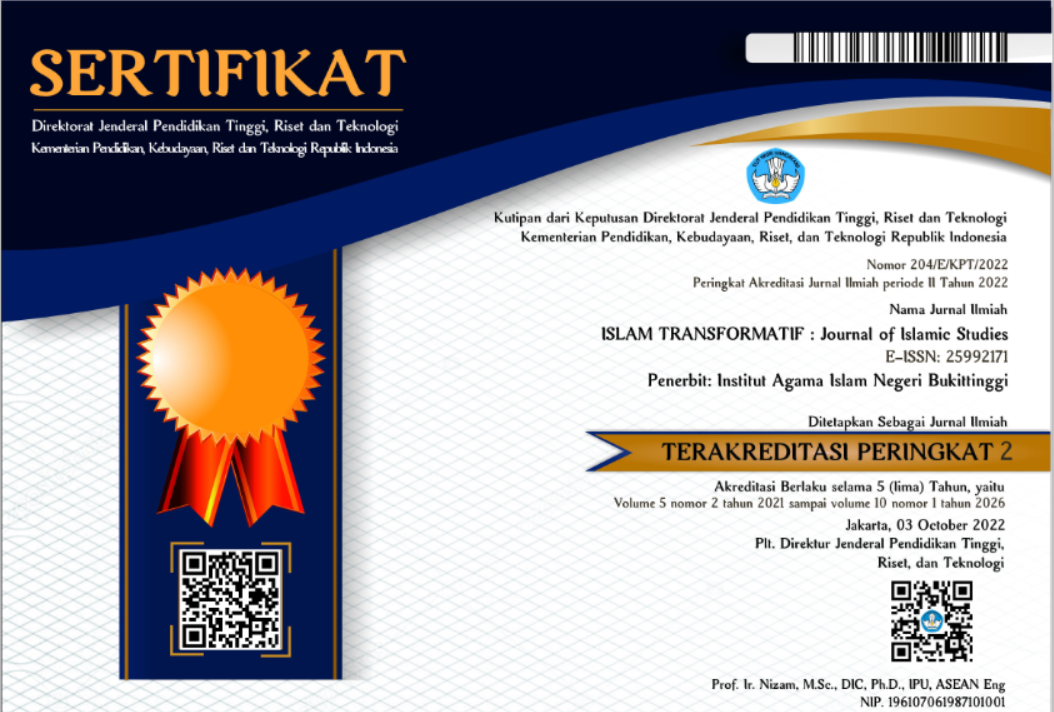Studi Aplikasi Hadis Era Mobile
DOI:
https://doi.org/10.30983/it.v4i1.2629Keywords:
Hadith, The Hadith Study Center, Android Mobile ApplicationAbstract
Hadith studies have experienced very rapid development. This is because many developing various applications or software that can facilitate the study of Hadith. The application and software are then not only a tool in the research activities of Hadith, but also for the benefit of studying the Hadith by the general public. Thus, the application or software must be developed so that it can be sought after and used by the general public. One such application is "One Day One Hadith" developed by the Hadith Study Center in mobile form. This mobile application is based on Android so that it can be used easily in all places and times. This application contains the interesting simple Hadiths from the Shahih Bukhari and is presented in different themes. The pattern of presentation is very interesting because every day a notification will be sent giving an overview of the Hadith of the day. With descriptive-analytical methods, this paper will examine the application 'Go to Heaven', starting from thea brief history of hadith literacy and the history of the hadith of the mobile era (digital), background of its development, features, patterns of presentation of the Hadith and their advantages and disadvantages.
Â
Â
References
Ash-Shiddieqy, Hasbi. Sejarah Perkembangan Hadis. Jakarta: Bulan Bintang, 1973.
Batubara, Hamdan Husein. “Pemanfaatan Ensiklopedi Hadis Kitab 9 Imam Sebagai Media Dan Sumber Belajar Hadis.†Muallimuna 2, no. 2 (2017): 65.
Fahrudin. “Kajian Hadis Era Android.†Diroyah 4, no. 1 (2019): 39.
Fajriana, Hidayati Nur. Pemikiran Dan Aktivitas Dakwah Dr. Ahmad Lutfi Fathullah, MA. Jakarta: UIN Syarif Hidayatullah, 2013.
Fikriyyah, Dliya Ul. “Telaah Aplikasi Hadis (Lidwa Pusaka).†Jurnal Studi Ilmu-Ilmu Al-Qur’an Dan Hadis 17, no. 2 (2016): 287.
Khaeruman, Badri. Otentisitas Hadis; Studi Kritis Atas Kajian Hadis Kontemporer. Bandung: ROSDA, 2004.
Maulana, Luthfi. “Periodesasi Perkembangan Studi Hadis (Dari Tradisi Lisan/Tulisan Hingga Berbasis Digital.†Esensia 17, no. 1 (2016): 120.
Mubhar, Oleh M Zulkarnain. “Quo Vadis Studi Hadis? Merefleksikan Perkembangan Dan Masa Depan Studi Hadis.†Al-Qalam 7, no. 2 (2015): 113–15.
Suryadilaga, M. Alfatih. Aplikasi Penelitian Hadis Dari Teks Ke Konteks. Yogyakarta: Kalimedia, 2016.
———. “Kajian Hadis Di Era Global.†Esensia 15, no. 2 (2014): 200.
———. Metodologi Syarah Hadis Dari Klasik Hingga Kontemporer. Yogyakarta: Kalimedia, 2017.
———. Ulumul Hadis. Yogyakarta: Kalimedia, 2015.
Ummah, Siti Syamsiyatul. “Digitalisasi Hadis (Studi Hadis Di Era Digital).†Jurnal Ilmu Hadis 4, no. 1 (2019): 7.
Zemakhsyari dan Nilna Fadlillah. “Software Ensiklopedi.†Studi Ilmu-Ilmu Al-Qur’an Dan Hadis 17, no. 2 (2016): 228.
https://pkh.or.id/tentang-kami/profil-pusatkajian-hadis. Di akses pada tanggal 02 Desember 2019 pukul 12:40 WIB.
https://karya.pkh.or.id/. Diakses pada tanggal 02 Desember 2019 pukul 12:47 WIB.
https://pkh.or.id/dinasi-online/ Diakses pada tanggal 02 Desember 2019 pukul 12.50 WIB.
https://artikula.id/alfatih/mengenal-sejarah-panjang-software-hadis/ Diakses pada tanggal 06 Februari 2020 pukul 16.00 WIB.
https://artikula.id/alfatih/era-digital-mengubah-budaya-dalam-kajian-hadis/ Diakses pada tanggal 06 Februari 2020 pukul 16.10 WIB.
Downloads
Additional Files
Published
How to Cite
Issue
Section
Citation Check
License
Authors who publish with this journal agree to the following terms:
- Authors retain copyright and grant the journal right of first publication with the work simultaneously licensed under a Creative Commons Attribution-ShareAlike 4.0 International License that allows others to share the work with an acknowledgment of the work's authorship and initial publication in this journal.
- Authors are able to enter into separate, additional contractual arrangements for the non-exclusive distribution of the journal's published version of the work (e.g., post it to an institutional repository or publish it in a book), with an acknowledgment of its initial publication in this journal.
- Authors are permitted and encouraged to post their work online (e.g., in institutional repositories or on their website) prior to and during the submission process, as it can lead to productive exchanges, as well as earlier and greater citation of published work (See The Effect of Open Access).




